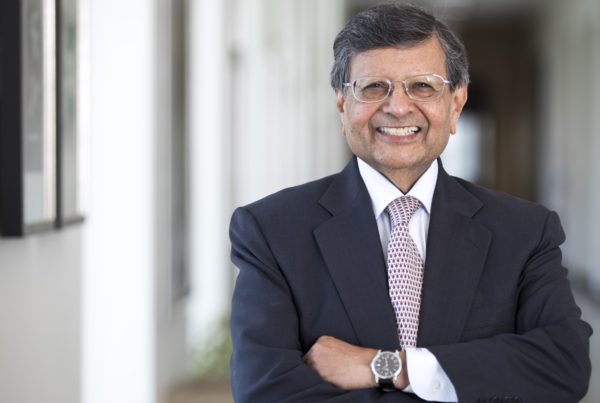Published: Feb 12, 2003 in Knowledge@Emory
If countries received Valentine cards, America would probably find itself a little disappointed this year. Recent polls have shown that U.S. popularity has slipped in many countries around the world. As a result, many American corporations face a challenge they haven’t faced since the Cold War: how to keep their company from paying a price for rising discontent against the country’s foreign policy.
Since 2000, negative feelings toward the U.S. have risen in 19 of 27 countries where benchmark data are available, according to a December report by the Pew Research Center for People and the Press. Although U.S. popularity had slid only by single digits in many of these 19 countries, anti-American feeling gained significant ground in the Middle East. In the past two years, approval ratings in Turkey slipped from 52% to 32%, and in Pakistan from 23% to 10%. And even the Pakistanis are better friends of U.S. policy than Egypt, where only 6% of the public now approve of the country.
Preventing a company’s foreign business from suffering as a result of dissatisfaction with Uncle Sam is challenging but usually not impossible, say scholars at Emory University and its Goizueta Business School. Professors say that the old mantra to “think global, act local” is still the key. From high-level strategy to marketing tactics, from management to cross-cultural communication between individuals, professors say that every aspect of running an international division offers opportunities to minimize political antagonism.
How do you build a foundation strong enough to withstand negative popular opinion about your country? Jagdish Sheth, a professor of marketing at Goizueta, says that there are several basic approaches American companies first developed during the Cold War that seem to work.
The first is to try to make that division seem as local as possible, giving the face representing the company a local face. Sears, for instance, always promoted local managers, which helped them face down anti-American sentiment in Latin America, he notes. Companies will also frequently offer U.S. immigrants who are natives of a country the opportunity to manage a division in that country.
Forging local partnerships can also be very important. “Coca-Cola has survived all political turbulence because its bottlers are local companies,” Sheth says. “And therefore, a Coca-Cola bottling plant, which is owned by a local entrepreneur who is politically wired, basically is insulated from all of the anti-American propaganda that’s in the country.”
Sometimes, companies succeed by working entirely behind the scenes, through a joint venture with a company that owns a local brand. “Your involvement does not have to involve physical presence, especially if you are providing your technology or expertise, your capital or some management oversight. So everything is done locally,” he says.
One thing that may make the marketer’s job easier, some professors say, is that people outside the U.S. tend to differentiate between Americans and by extension American firms and their government. “The big guy on the block is easily seen as a bully, but it does not necessarily transfer to the American tourists that people meet on an individual level,” says Devon Johnson, a professor of marketing who grew up in Jamaica.
The one exception, some professor’s caution, may be energy and mineral firms. John Boli, a professor of sociology who studies globalization, says that the U.S. government’s interests are often seen as being closely aligned with the interests of oil companies and firms that extract minerals. For example, Boli says, outside the U.S., most people consider the threat of war with Iraq to be about oil and not any threat Saddam Hussein might pose.
But even if the majority of global businesses can count on their customers not to view them as part of a larger Yankee conspiracy, neutrality is not the same thing as acceptance. Winning local trust requires finding ways to fulfill the needs and aspirations of the community the company is trying to serve, says Nancy Roth Remington, the executive director of international programs for Goizueta.
Roth Remington, who has led an educational tour for Goizueta MBA students in China for the last three years, says that American companies doing well now in China have done so in part because they have paid close attention to the needs and aspirations of their market. McDonald’s in Beijing, for instance, sells public transit tickets. Although they make no money on the tickets, she says, it is a good way to build foot traffic. They’ve also run promotions that involve giving special cups to teachers.
But Ronald isn’t the only savvy marketer in China. Coca-Cola is a sponsor of a high-profile educational outreach program that serves poor neighborhoods, Roth Remington observes. And it’s also tried to align itself with something else that many Chinese care about – the Olympics. Several years ago, knowing that Beijing had a good shot for the 2008 Olympics, marketers at Coca-Cola created commemorative cans and posters in advance of the announcement. “And literally within minutes of the announcement being made on television, the trucks were on the street and the banners were being unfurled, that Coca-Cola was celebrating the Olympics in China,” she says.
Such successes don’t happen by accident. Professors argue that companies that do well in a new market do so by joining the society they are serving. Deborah Valentine, a lecturer in communications and co-author of a forthcoming book on cross-cultural understanding for managers, says that developing cultural sensitivity is essential. Even for executives who have taken the time to learn the language, it’s easy to misunderstand what is being said – or the message you are conveying.
The list of possible cultural misunderstandings is a long one, according to Valentine. Here, eye contact tends to be important. In some cultures, however, it’s considered rude. Here, interrupting during a discussion is often considered a sign of engagement. In China, it’s simply bad manners. Here, talking directly is usually appreciated. In Argentina, many people prefer to speak more indirectly. Here, everyone shakes hands before a meeting. In the Arab Aculture, women and men are usually not allowed to touch. Even standard business communications such as a contract can be the object of huge cultural misunderstandings, as the degree of seriousness to written communications varies a great deal from culture to culture.
And the possibility for missteps doesn’t end with communication, says Valentine, whose book, a Guide to Cross-Cultural Communication, is scheduled to be published this summer by Prentice Hall. Understanding social hierarchies can be important too.
In Japan, she says, the most important person in a meeting is always given his tea first, followed by the next most important person, and the next, all in a strict pecking order. “Americans who are ill-trained in this type of strict hierarchy and business protocol might not understand that they are to wait to sip their tea until the highest ranking person has sipped first. Understanding business protocol is key to successful communication across cultures,” says Valentine.
Unfortunately, none of the elements required to make a foreign division a success is quick or easy. Ultimately, professors say that a company’s ability to ride out political discontent now may have to do more with a commitment it made to a particular market 10 or 20 years ago than any kind of damage control. Taking a long-term view is not a simple thing in a world where executives are rewarded and punished on the basis of quarterly earnings, but Roth Remington says such patience is often a key element of eventual success. McDonald’s, for instance, negotiated for 13 years before it was able to open its first outlet in Russia, she says.
“It’s those companies that are not looking at damage control, it’s those that are looking to tie their products and services to the needs and tastes and desires of the communities in which they are located that will be the most successful in riding whatever the storm is,” Roth Remington says.





